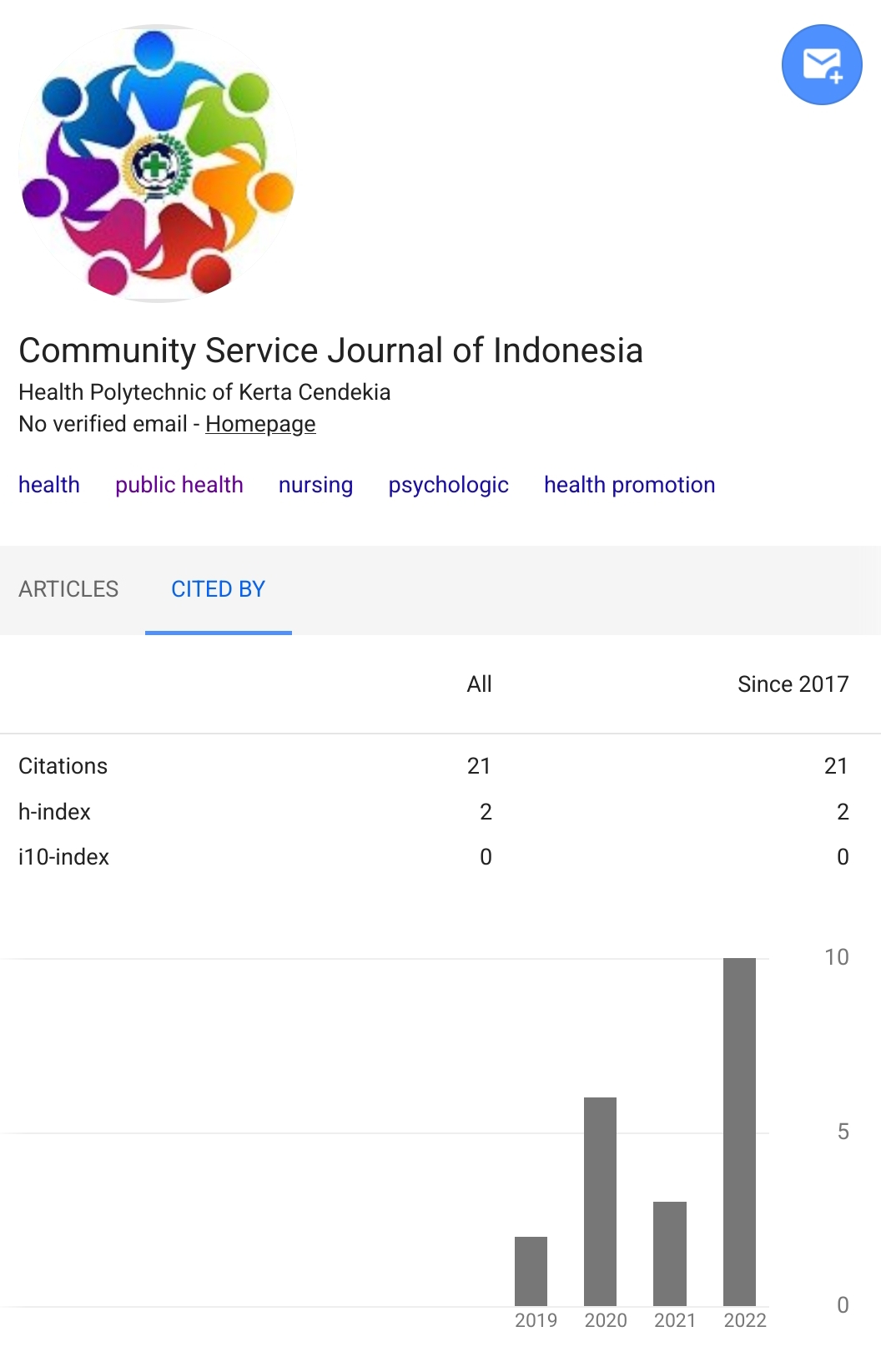SELF-CARE TRAINING FOR SANTRI AS AN EFFORT TO PREVENT SCABIES IN PESANTREN
DOI:
https://doi.org/10.36720/csji.v6i2.592Keywords:
Boarding School, Hygiene, Scabies, Self-careAbstract
Islamic boarding schools in Indonesia have classic problems related to the health of students, one of which is common in Islamic boarding schools and identical to the lives of students, is scabies. This community service activity was carried out at the As Syafiiyah Islamic boarding school to provide solutions to the problems of the As Syafiiyah Islamic boarding school community by providing education, training as well and mentoring Islamic boarding school health cadres in preventing scabies. This activity is carried out by providing education, training, and assistance to students and poskestren cadres about "self-care" in preventing scabies. Evaluation of this activity was carried out using pre and post-test scores. It was found that there was an increase in the post-test score compared to the pre-test. Before the self-care training was given, it was found that 20% of the students were still not clean in maintaining their hygiene, but after the self-care training was given, it was found that none (0%) of the students were clean and 58.5% of their hygiene was good. It is concluded that self-care training can improve the ability of students to prevent scabies through personal hygiene skills which include: clothing hygiene, skin hygiene, hand and nail hygiene, genital hygiene, towel hygiene, and cleanliness of prayer tools. The behavior of preventing scabies through maintaining personal hygiene needs to be stated in the Pesantren regulations and socialized to the Pesantren community and requires support from the Kyai or Pesantren leaders, including Bu Nyai Pesantren so that it can be implemented properly.
References
Engelman, D., Cantey, P. T., Marks, M., Solomon, A. W., Chang, A. Y., Chosidow, O., Enbiale, W., Engels, D., Hay, R. J., Hendrickx, D., Hotez, P. J., Kaldor, J. M., Kama, M., Mackenzie, C. D., McCarthy, J. S., Martin, D. L., Mengistu, B., Maurer, T., Negussu, N., … Steer, A. C. (2019). The public health control of scabies: priorities for research and action. The Lancet, 394(10192), 81–92. https://doi.org/10.1016/S0140-6736(19)31136-5
Febrina, W., Harminarti, N., & Ali, H. (2021). Gambaran Kualitas Hidup Santriwati yang Menderita Skabies di Pondok Pesantren Kecamatan Enam Lingkung, Kabupaten Padang Pariaman. Jurnal Kesehatan Andalas, 9(4), 412. https://doi.org/10.25077/jka.v9i4.1504
Mayrona, C. T., Subchan, P., Widodo, A., & Lingkungan, S. (2018). Pengaruh Sanitasi Lingkungan Terhadap Prevalensi Terjadinya Penyakit Scabies Di Pondok Pesantren Matholiul Huda Al Kautsar Kabupaten Pati. Diponegoro Medical Journal (Jurnal Kedokteran Diponegoro), 7(1), 100–112.
Pusat Data dan Informasi, K. R. (2020). Indonesian Health Profile 2019. In Indonesian Ministry of Health Information Center.
Romani, L., Whitfeld, M. J., Koroivueta, J., Kama, M., Wand, H., Tikoduadua, L., Tuicakau, M., Koroi, A., Ritova, R., Andrews, R., Kaldor, J. M., & Steer, A. C. (2017). The epidemiology of scabies and impetigo in relation to demographic and residential characteristics: Baseline findings from the skin health intervention Fiji Trial. American Journal of Tropical Medicine and Hygiene, 97(3), 845–850. https://doi.org/10.4269/ajtmh.16-0753
Samosir, K., S, H. D., & MF, M. Y. (2020). Hubungan Personal Hygiene dengan Kejadian Skabies di Pondok Pesantren Madani Unggulan, Kabupaten Bintan. Jurnal Ilmu Kesehatan Masyarakat, 19(3), 144–152.
Susanti, N., Islam, U., Maulana, N., Ibrahim, M., Indrawan, D., Islam, U., Maulana, N., & Ibrahim, M. (2021). Pesantren Sehat Mewujudkan Pesantren dan Generasi Santri Sehat (Issue October). UIN MALIKI Press.
Trasia, R. F. (2020). Review SCABIES IN INDONESIA : EPIDEMIOLOGY AND PREVENTION. 1(2).
Vos, T., Allen, C., Arora, M., Barber, R. M., Brown, A., Carter, A., Casey, D. C., Charlson, F. J., Chen, A. Z., Coggeshall, M., Cornaby, L., Dandona, L., Dicker, D. J., Dilegge, T., Erskine, H. E., Ferrari, A. J., Fitzmaurice, C., Fleming, T., Forouzanfar, M. H., … Zuhlke, L. J. (2016). Global, regional, and national incidence, prevalence, and years lived with disability for 310 diseases and injuries, 1990–2015: a systematic analysis for the Global Burden of Disease Study 2015. The Lancet, 388(10053), 1545–1602. https://doi.org/10.1016/S0140-6736(16)31678-6
WHO. (2019). WHO Informal Consultation on a Framework for Scabies Control Meeting report (Issue February).
Wulandari, A. (2018). Hubungan Personal Hygiene dan Sanitasi Lingkungan dengan Kejadian Skabies pada Santri di Pesantren Ulumul Qur’an Kecamatan Bebesen Kabupaten Aceh Tengah. Global Health Science, 3(4), 322–328.
Downloads
Published
How to Cite
Issue
Section
License
Authors who publish with Community Service Journal of Indonesia agree to the following terms:
- Authors retain copyright licensed under a Creative Commons Attribution-NonCommercial 4.0 (CC BY-NC 4.0), which allows others to remix, tweak, and build upon the authors' work non-commercially, and although the others' new works must also acknowledge the authors and be non-commercial, they don't have to license their derivative works on the same terms.
- Authors are permitted and encouraged to post their work online (e.g., in institutional repositories or on their website) prior to and during the submission process, as it can lead to productive exchanges, as well as earlier and greater citation of published work (See The Effect of Open Access). Authors can archive pre-print and post-print or publisher's version/PDF.














